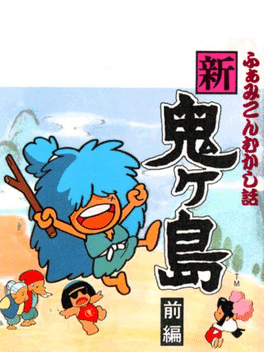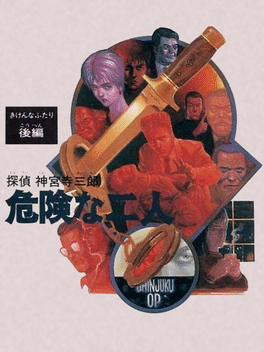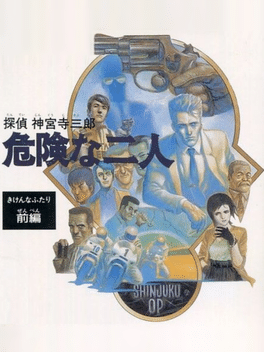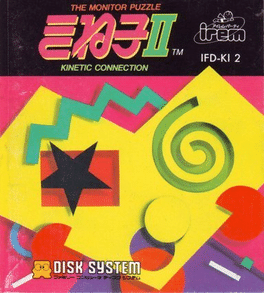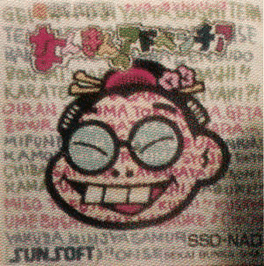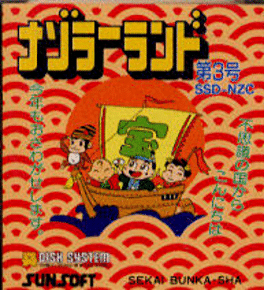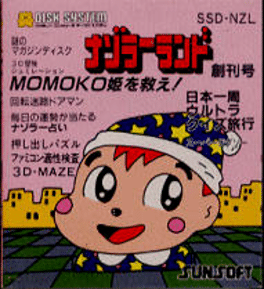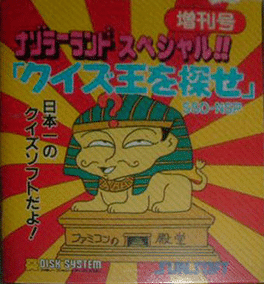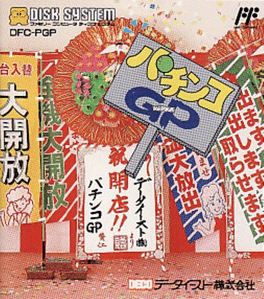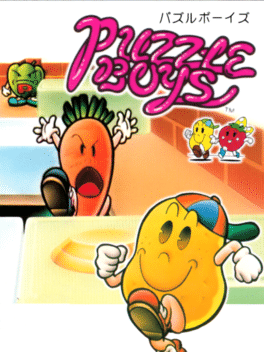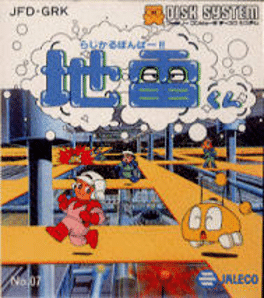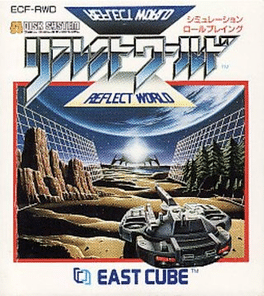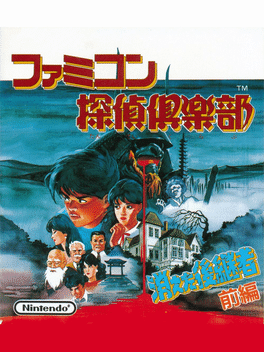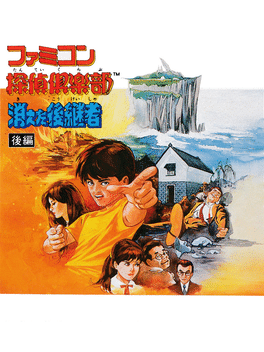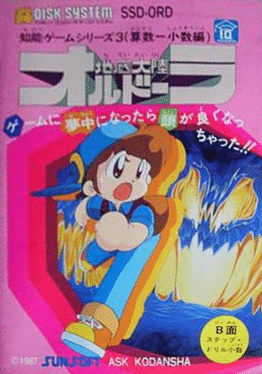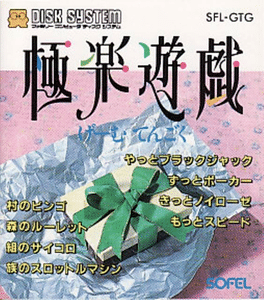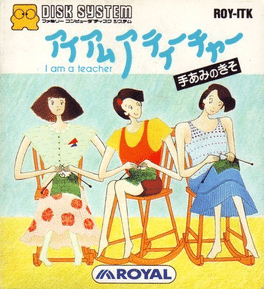Most Popular Fds Games - Page 3
-
Famicom Mukashibanashi: Shin Onigashima - Zenpen
1987
Shin Onigashima is a two disk adventure game released on the Famicom Disk System. Despite being first-party software, it was never released outside of Japan. A two-disk adventure game, Shin Onigashima (or to give it its full title "Famicom Mukashi Banashi: Shin Onigashima", or "Famicom Fairy Tales: New Oni Island" thereabouts) was released in two parts: The first on September 4th 1987 and the second on September 20 1987. The Game stops halfway through the story. The game is depicted like other adventure games for the system, such as Portopia or Hokkaido Serial Murders, though with a far gentler fairy tale presentation rather than a gritty crime thriller. The game's story is based on popular centuries-old Japanese folklore, such as the story of Momotaro and tales depicting the demonic Oni and their mischief. The original characters created for this game would be later referenced by future Nintendo products with retrospective elements, such as Captain Rainbow or the Super Smash Bros series (SSB Brawl even had a re -
Famicom Tantei Club Part II: Ushiro ni Tatsu Shoujo - Zenpen
1989
Famicom Tantei Club Part II: Ushiro ni Tatsu Shoujo (also known as Famicom Detective Club: The Girl in Back) is the second game in the Famicom Tantei Club franchise. It is a prequel to the first game, Famicom Tantei Club: Kieta Koukeisha. The game was originally released on two discs for the Famicom Disk System, the first disc released on May 23, 1989 and the second disc on June 30, 1989. The game was later redistributed as a Super Famicom game (with improved graphics and sound, added gameplay mechanics, and other minor changes) through Nintendo Power on April 1, 1998. On August 10, 2004, the game was released under the Famicom Mini Series for the Game Boy Advance (the Famicom Disk System version). The Super Famicom version was also released for the Virtual Console on April 30, 2008. Famicom Tantei Club Part II was developed by Nintendo R&D1 and published by Nintendo. -
Tantei Jinguji Saburo: Kiken na Futari - Kouhen
1989
The two disk "A Dangerous Duo" mystery, and the 3rd entry in the Tantei Jinguuji Saburo series. Jinguji is invited to visits a race circuit where the motorcycle racer, Okazaki, suddenly crashes, but a different racer's body is recovered at the crash site. At the same time Okazaki's wife is found dead. Tantei Jinguuji Saburo: Kiken na Futari is the third game in the Jinguuji Saburo series, known in the West as Jake Hunter. It was originally released across two Famicom Disk System disks, the second of which went on sale several months after the first. The game was eventually localized, as part of the Jake Hunter: Detective Chronicles DS compilation of his early cases, as Jake Hunter: Crash and Burn. In this game Detective Jinguuji Saburo/Jake Hunter must solve the mystery behind a sudden death during a motorcycle race. The intrigue is deepened when the body recovered is actually of a different racer. -
Tantei Jinguji Saburo: Kiken na Futari - Zenpen
1988
Tantei Jinguuji Saburo: Kiken na Futari is the third game in the Jinguuji Saburo series, known in the West as Jake Hunter. It was originally released across two Famicom Disk System disks, the second of which went on sale several months after the first. The game was eventually localized, as part of the Jake Hunter: Detective Chronicles DS compilation of his early cases, as Jake Hunter: Crash and Burn. In this game Detective Jinguuji Saburo/Jake Hunter must solve the mystery behind a sudden death during a motorcycle race. The intrigue is deepened when the body recovered is actually of a different racer. -
Monitor Puzzle Kineko: Kinetic Connection Vol. II
1987
An image puzzle game and the follow up to the original Kinetic Connection. It was developed by Tamtex and published by Irem for the Famicom Disk System. Kinetic Connection Vol. 2 (or Monitor Puzzle Kineco: Kinetic Connection Vol. 2 to give it its full title) is a follow up to Tamtex's Kinetic Connection, featuring more animated pictures to craft from composite pieces similarly to a jigsaw puzzle. As with its forebear, the trick to Kinetic Connection Vol 2 is to closely observe the moving parts in each of the pieces as the animation goes through its loop in order to glean hints as to where each piece belongs. Though very much simply more of the same, the new puzzles have some interesting ideas behind them. The hardest puzzle happens to be a Defender-like game that responds to the player's movements as they try to assemble the puzzle. -
Moon Ball Magic
1988
Moon Ball Magic
1988
A pinball game published by Squaresoft for the Famicom Disk System. Moon Ball Magic is a pinball game released exclusively through the Famicom Disk System's "Disk Writer" service, where the player must write the game onto an existing FDS disk before playing it. As such, it has no box art and is difficult to find. It was published by Squaresoft through their DOG label, though it (and Akuu Senki Raijin, which was released on the same day) would be the last games ever published through that label - Square would focus on regular Famicom carts from then on. Moon Ball Magic begins with a fake-out, as dropping the ball in one of the nearby holes will begin an elaborate intro sequence which the player can control. Whatever score they earn will also carry over into the game proper once it begins. The game has eleven tables and the player can move to the next one by putting the pinball down a difficult-to-reach hole. Later levels provide more points, though are more difficult as well. -
Nankin no Adventure
1988
Nankin no Adventure
1988
A Famicom Disk System adventure game developed by Sunsoft in 1988. Nankin no Adventure is a Famicom Disk System adventure game from SunSoft that plays much like every other Famicom adventure game of the era. The player selects commands from a menu in order to talk to NPCs and solve puzzles which will eventually allow them to progress. As with many of these Famicom text adventures there is a linear critical path that the player must follow in order to move to new areas and reach the next point of the story. Nankin refers to a semi-obscure manga artist of the same name who was behind much of the art design of the game. Though the game doesn't include any of his pre-existing licenses, his distinctive art style is present throughout. This approach might be equated to Akira Toriyama's artistic involvement with the Dragon Quest and Chrono games. -
Nazoler Land Dai 2-gou
1987
The second game in the Nazoler Land series of minigame compilations published by SunSoft for the Famicom Disk System. Nazoler Land Dai-2-gou is the sequel to Nazoler Land Soukan-gou and is similarly a minigame connection with a magazine theme. It contains six minigames, rather than its predecessor's eight. A notable feature of this compilation is that all the minigames are represented as Famicom disks on the select screen, and once a game is chosen an animation shows the disk being loaded in the Famicom Disk System. The minigames include: Patalick A panel-switching puzzle game that shares some similarities with Q*Bert (specifically, switching panel colors and the isometric perspective) but is far more cerebral and less active in nature. The goal is to use the shape-shifting protagonist (who transforms from an angel to a devil form) to switch all the panels on the screen to the same color, keeping in mind that every panel in a horizontal and vertical line will flip over. Geographic Nazoler Quiz Like the transpor -
Nazoler Land Dai 3-gou
1988
The third and final core entry in the Nazoler Land series of minigame compilations with a magazine theme. It was developed and published by SunSoft for the Famicom Disk System. Nazoler Land Dai-3-gou is the third game in the Nazoler Land series. Like its predecessors, it was developed and published by Sunsoft for Nintendo's Famicom Disk System in Japan only, and contains various minigames with diverse gameplay. These minigames include: Sugoro Quiz All three Nazoler games had a quiz minigame of some kind, but Sugoro Quiz is the first to emphasize a multiplayer aspect. Two to four human players compete in a board game in which players progress by answering trivia questions. Tomo Bakuso The second minigame starring the schoolgirl Tomo, after Nazoler Land Dai 2 Gou's Blast Tomo. In this game, she is trying to pass through a level of platforms, some of which will block access after being passed through a certain number of times. Tanteidan Boy Nazoler An early example of an "escape the room" adventure game, which wo -
Nazoler Land Soukan-gou
1987
A mini-game compilation from SunSoft for the Famicom Disk System. It is the first in a series of four Nazoler games. Nazoler Land Soukan-gou is the first in a series of minigame collections from SunSoft developed especially for Nintendo's Famicom Disk System peripheral. It was followed by two direct sequels and a quiz-based spin-off. Nazoler Land Soukan-gou (or Nazoler Land Vol. 1) has eight minigames that the player can select from a menu after loading the game up and switching the disk around. These are: Rotation Maze A maze-like puzzle game where a small circular being has to pass through a maze filled with dividers. The player can only pass through these dividers if there is room for it to turn around, otherwise it blocks the player's progress. The goal is to find the correct path through the maze. Nazoler Fortune-Telling Despite using signs of the Zodiac and suggesting a fortune-telling aspect, the game is actually a variant on the classic strategy board game Mastermind: The goal is to find the right combi -
Nazoler Land Special!! Quiz-Ou wo Ikuse
1988
A spin-off of Sunsoft's Nazoler Land mini-game collections for the Famicom Disk System, this special version is a trivia game. Like the other Nazoler Land games, it was never released outside of Japan. Nazoler Land Special: Quiz-ou wo Ikuse (or "Search for the Quiz Masters") is a trivia game in which the player must answer trivia questions from eight different opponents across Japan in order to win the game. Because the game was never released outside of Japan, it needs a considerable amount of Japanese knowledge to play, both to understand the questions and to be able to answer them. It is not part of the core Nazoler Land series of games, which are all mini-game compilations. -
Pachinko GP
1988
Pachinko GP
1988
A pachinko simulator for the Famicom Disk System. It was published by Data East in Japan only. Pachinko GP (or Pachinko Grand Prix) is a Pachinko simulator from Data East for the Famicom Disk System. The goal is to play Pachinko in various machines found in Pachinko parlors across Japan, attempting to reach a Pachinko ball target (the total grows each time the player successfully fires a ball into a point-scoring zone) before a time limit expires before they move onto the next machine. -
Puzzle Boys
1990
Puzzle Boys
1990
Puzzle Boys is the second game in the Puzzle Boy series of 5 games. The first game is the most well known, released as Kwirk on the GameBoy in North America. This is Atlus’s only FDS game, and a late one at that, as the FDS was pratically dead by the time the GameBoy came out. This game improves on Kwirk by adding color, a really fun two player on the same screen mode with the ability to handicap the better player, and way more puzzles in Puzzle Challenge Mode, 80 vs. Kwirk’s 30. -
Radical Bomber!! Jirai-kun
1988
A strategy puzzle game developed by Jaleco involving blowing up connections between squares in a grid to trap opponents. Radical Bomber!! Jirai-kun ("Jirai" means landmine) is a strategic puzzle game from Jaleco that has more than a passing resemblance to Hudson's Bomberman franchise. However, rather than trying to defeat the opponents in a frantic real-time environment, the goal of Radical Bomber is to carefully think out a plan of action and find a way to trap the opponents by removing connections between each "square" on the map. Successfully isolating an opponent from the rest of the board causes them to forfeit the game, and doing this with every opponent allows Jirai-kun to move onto the next level. -
Reflect World
1987
Reflect World
1987
Reflect World is a shooter with RPG elements developed by East Cube and released for the Famicom Disk System. Reflect World is a vehicle-based top-down shoot 'em up with a lot of RPG and simulation elements. The player controls a large and formidable tank as it makes its way across a wasteland, destroying enemies and tinkering with its many modes and functions. The game is extremely difficult to understand unless the player is knowledgeable in Japanese (the game was never released outside of Japan), the instruction manual or, preferably, both. The game was developed and published by East Cube, an obscure Japanese developer that largely focused on Japanese computer games. Reflect World is the only game they ever released on a Nintendo console. -
Famicom Tantei Club: Kieta Koukeisha - Kouhen
1988
Famicom Tantei Club: Kieta Kōkeisha is an adventure game developed and published by Nintendo for the Family Computer Disk System spanning two disks. The game was never released outside Japan. The scenario was written by Toru Osawa and Nagihiro Asama, based on the concept by Yoshio Sakamoto. The story begins with a man named "Amachi" discovering the fallen protagonist on the ground near a cliff. The protagonist discovers that he has lost his memory, and after recuperating, he revisits the cliff and meets a young girl named Ayumi Tachibana. He learns from Ayumi that he is an assistant detective investigating the death of Kiku Ayashiro, and heads over to the nearby Ayashiro estate located in Myoujin village. The Ayashiro family owns a huge plot of land passed down from generation to generation, but there is a strange saying in the village that the dead will return to life to kill anyone who attempts to steal the treasure of the Ayashiro family. As the protagonist investigates the mysterious death of Kiku Ayashiro, h -
Famicom Tantei Club: Kieta Koukeisha - Zenpen
1988
This is part 2 of Famicom Tantei Club: Kieta Kōkeisha which is an adventure game developed and published by Nintendo for the Family Computer Disk System spanning two disks. The game was never released outside Japan. The scenario was written by Toru Osawa and Nagihiro Asama, based on the concept by Yoshio Sakamoto. The story begins with a man named "Amachi" discovering the fallen protagonist on the ground near a cliff. The protagonist discovers that he has lost his memory, and after recuperating, he revisits the cliff and meets a young girl named Ayumi Tachibana. He learns from Ayumi that he is an assistant detective investigating the death of Kiku Ayashiro, and heads over to the nearby Ayashiro estate located in Myoujin village. The Ayashiro family owns a huge plot of land passed down from generation to generation, but there is a strange saying in the village that the dead will return to life to kill anyone who attempts to steal the treasure of the Ayashiro family. As the protagonist investigates the mysterious d -
Chitei Tairiku Orudoora
1987
A side-scrolling platformer developed and published by SunSoft for the Famicom Disk System. It is the third entry in a series of educational math games. Chitei Tairiku Orudora ("Underground Continent Orudora") is a Famicom Disk System action platformer from SunSoft and the third part of their Chinou Game Series, each borrowing an existing NES game's model (in Orudora's case, Atlantis no Nazo) and adding arithmetic problems to it. In Orudora, the actual math puzzles are relegated to an ancillary mini-game found on the disk. The goal of the game is to help a young explorer pass through the underground world of Orudora, taking out enemies along the way with his bombs. The bombs fly in a specific arc, so the player needs to be the right distance from the enemy in order to hit it. The player character can also crouch, jump, climb ladders and use other abilities common to platformers. The two other Chinou Game Series games are Adian no Tsue and Super Boy Allan, the latter of which was released on the same day as -
Gokuraku Yuugi: Game Tengoku
1988
An assortment of eight party games developed and published by Sofel for the Famicom Disk System. Most are based around gambling. SOFEL's Gokuraku Yuugi: Game Tengoku ("Paradise Play: Game Heaven" - no relation to Rhythm Heaven) is a mini-game collection that provides eight different types of game framed as different stations on a TV. The games are variations on: Bingo Roulette Dice Slots Blackjack Poker Concentration (a.k.a. Memory or Pairs) Speed (a.k.a. Spit) The Bingo and Dice games have no scoring system in-game; rather, they are simulations of a randomization process that players can use with their own physical scoring systems at home (such as bingo cards or Yahtzee/Dice Poker sheets). -
I Am a Teacher: Teami no Kiso
1986
An instructional program for learning how to knit by hand for the Famicom Disk System. It was developed by Royal Kougyou and follows their earlier educational software I Am a Teacher: Super Mario no Sweater. I Am a Teacher: Teami no Kiso (roughly "I Am a Teacher: The Basics of Hand-Knitting") is an instructional tool to help would-be knitters create their own garments. The user can input the amount, length and type of wool they have and the size and type of the item of clothing they wish to create and the program will put together a guide to help them achieve this goal. The user can save their progress at any time and pick up from where they left off. Unlike Super Mario no Sweater, its predecessor in the I Am A Teacher series, there are no Nintendo characters present in Teami no Kiso. Rather, Teami no Kiso is a guide for teaching the fundamentals of knitting to novices, with Super Mario no Sweater intended for those who already have some experience who wish to try new Mario-themed designs. As with Super Mario no
